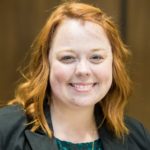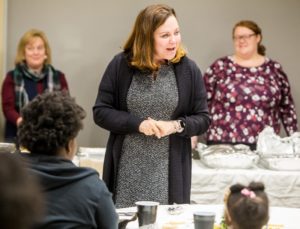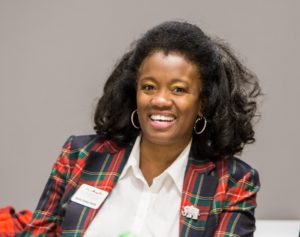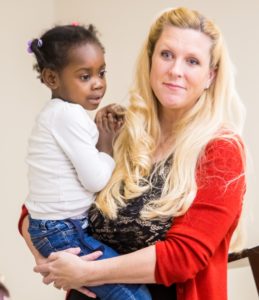Take a look at what child advocates are saying about the effectiveness of the evidence-based Strengthening Families Program. Neil White, who tells the stories of Children’s Trust, talked to them about their thoughts on what SFP is doing for children and families across South Carolina.
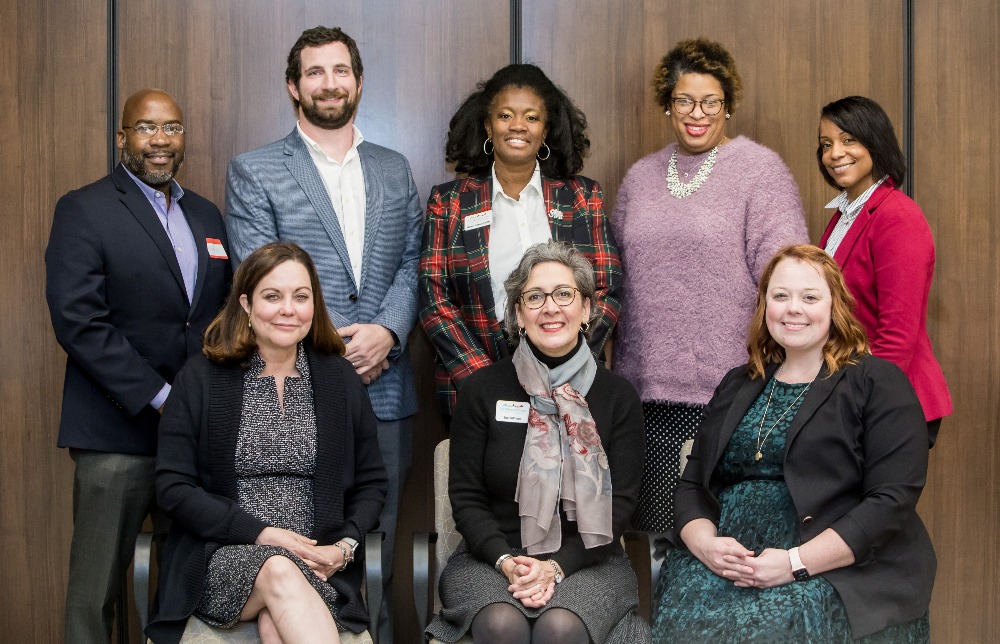
Front row (L-R): Cheryl Holland, Children’s Trust board; Sue Williams, Children’s Trust; Emily Parks, DSS. Back row: Brennon Graham, Growing Home Southeast; Phillip Cease, Children’s Trust; Karen Dukes-Smith, Children’s Trust; Nicole Foulks, DSS; Shaneka Oliver, DSS.
There’s nothing quite like seeing a Strengthening Families Program session and graduation ceremony up close.
The goal of the 14-week program, which is for families with children ages 6 to 11, is to help parents and caregivers improve parenting skills, develop positive discipline practices, stay resilient in tough times, reduce conflict, and assist children with social skills, relationships, and school performance. All of these factors play an important role in keeping families strong while protecting against potential child abuse or neglect.
During the fall cycle, Children’s Trust guided 23 partners delivering the program at 33 sites in 24 counties. Children’s Trust provides training for partners, collects data, and monitors the program to ensure it reaches the maximum potential for children and families as part of its overall mission to prevent child abuse and neglect in South Carolina. The Duke Endowment and the S.C. Department of Social Services serve as the funding partners in this effort.
The local partners implement the program with eight to 12 families in their communities over the 14 weeks to improve family relationships and reduce problem behaviors. Each two-hour session includes a family meal before splitting into a separate parenting class and child class. They come together again as a full group to practice new skills at the end of the evening.
At a recent SFP graduation at one of the five Growing Home Southeast sites, several program leaders and funders got the opportunity to learn more about what the program does for families working to build stronger bonds in their homes. They are all convinced the program is providing a real benefit to children, parents, schools and communities.
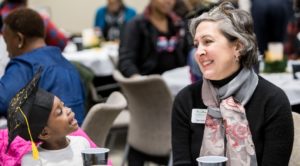
Sue Williams, Children’s Trust CEO, who oversaw the organization’s introduction of the program starting in 2014
“Every time I attend a graduation, I am reminded how we all want to be good parents and provide the best we can for our children. I applaud the efforts of the parents for making the time week after week, for wanting to learn, and for being vulnerable – and the kids just want to be kids. I always find it helpful to see and hear from the parents, and I’m always inspired by their commitment to be better parents.”
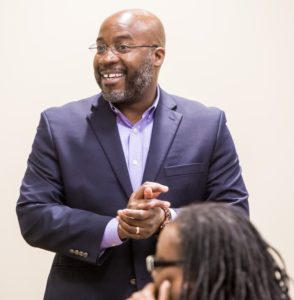
Brennon Graham, president and CEO of Growing Home Southeast, an organization committed to providing quality, strength-based services to families, youth and children
“It really gives an opportunity for families to show that they are committed to success. It sets the example for those kids, who watch their parents come out for 14 weeks, showing that they’re committed and dedicated to their homes, wanting to ensure that they’re safe and stable and the families are really strong. For me it’s just really important to see that because children in our families are the future. Of course, that seems so cliché. But when you have a program that has evidence to back up the work that we’re doing, we know it’s really good for our community and for families. That’s just really powerful, when you know that it works, and when the children even say, ‘I’m happier at home, my parents are doing this differently.’ They feel the effect of it.”
Emily Parks, chief of staff to S.C. Department of Social Services director Michael Leach
“We’ve talked about the program a lot. I’ve seen the research, and the research is great. But seeing it in action with the families, hearing their experiences, hearing how they’re putting the home practice assignments to the test and how that’s producing results that are going to be able to last in their families, I think it’s just so impactful. Director Leach and I are firm believers in being patient and keeping the family together and keep giving families what they need to be successful. This program does just that.”
Cheryl Holland, Children’s Trust board member and the founder and president of Abacus Planning Group
“You come in here, just sit down, and you see the families themselves talk about the improvement in action. We know the data and the evidence supports all of this. But you just have to sit at the table, listen to them, talk about what the 14 weeks have meant to them. You listen to the parents and what they’ve learned, and you’re like, this is amazing. Very down to earth, very warm. Lots of friendships have been made. It’s a great experience. … My commitment to Children’s Trust is deep, but having the opportunity to witness the success of what we do, understand how deeply the learning objectives tie to what we strive to do at Abacus each day, and listen to the parents talk with such vulnerability and passion about what they are learning was a special moment in time.”
Karen Dukes-Smith, Children’s Trust SFP coordinator who worked with nine different sites during the 14 weeks of the fall 2019 cycle
“I’ve been doing this for nearly seven years, and it never grows old to see the impact that we are making in our communities. It’s a learning and growing process, but every year it seems that we are making a bigger impact not only for the families but for our communities as a whole. I’m really thrilled with the progress that SFP has been making, and I’m so thankful that Children’s Trust, DSS and The Duke Endowment see how this is working and that efforts are being put in place to make it continue. They’re visionaries.”
Tami Mistretta, site coordinator for Growing Home Southeast
“I believe in the program. I started with it in 2014, and the moment I went to my first Strengthening Families Program training, I went back to my supervisor and I said, ‘I want to do this for the rest of my life.’ It’s a place to build on strengths, to offer praise and to build on positivity, to have an environment where it feels like a family. It’s not a support group, but yet it feels like a support group to our families. They feel connected, they feel not alone. If families know better, they can do better. We teach families how to do it better. That’s what this program does. … Each week we give the families a theme gift, and it goes along with homework complementary to the program. So we’ve heard back from them that they made the brownies, they used the calendar, they played child’s game. And the children then, in their groups, were saying how fun it was to have child’s game and very positive about that time alone with their parents. On both sides, as a site coordinator, while I’m not facilitating (the group sessions), I’ve heard firsthand, positive comments back from the program.”



